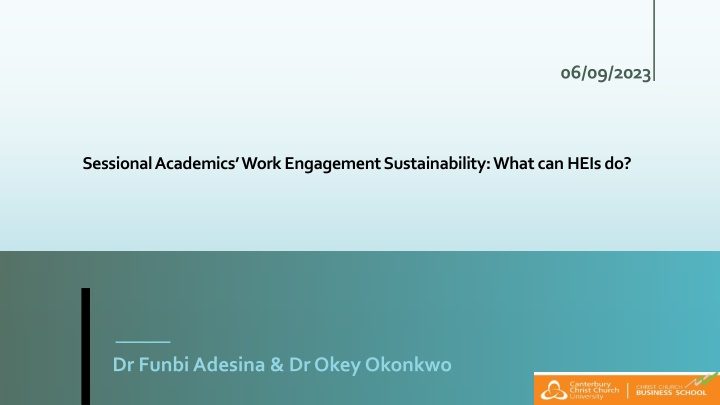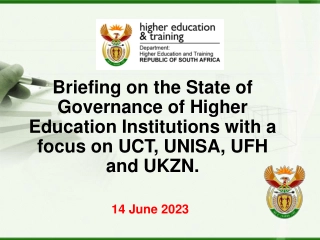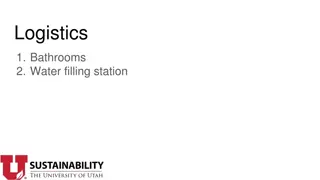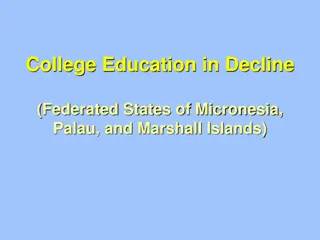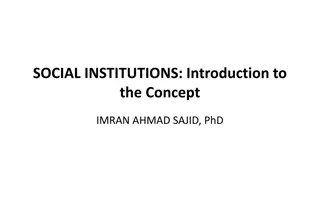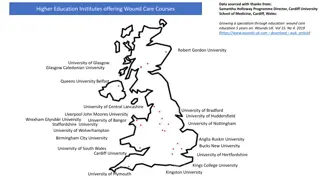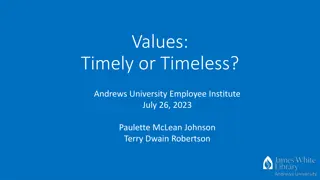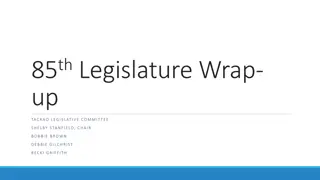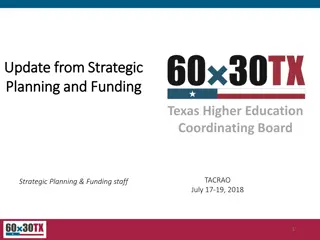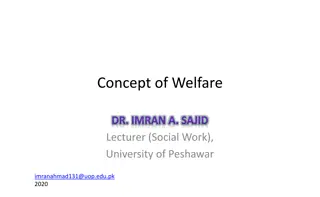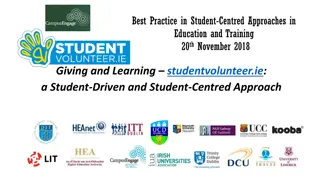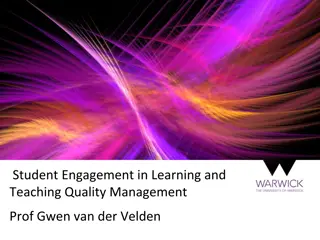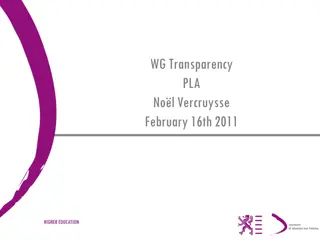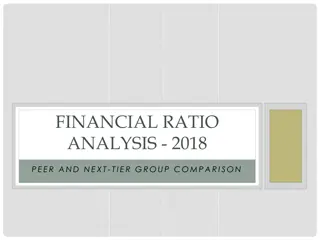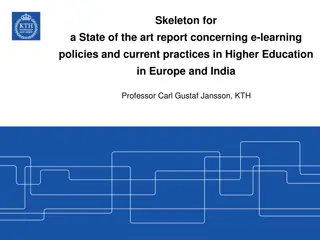Enhancing Work Engagement Sustainability in Higher Education Institutions
This presentation delves into the psychological contracts of sessional academics in higher education institutions, exploring their impact on work engagement sustainability. It highlights the challenges faced by sessional academics and offers recommendations for HEIs to improve their work engagement. The discussion touches on the distinctions between relational and transactional psychological contracts and emphasizes the importance of fostering trust and long-term relationships for sustainable work engagement.
Download Presentation

Please find below an Image/Link to download the presentation.
The content on the website is provided AS IS for your information and personal use only. It may not be sold, licensed, or shared on other websites without obtaining consent from the author.If you encounter any issues during the download, it is possible that the publisher has removed the file from their server.
You are allowed to download the files provided on this website for personal or commercial use, subject to the condition that they are used lawfully. All files are the property of their respective owners.
The content on the website is provided AS IS for your information and personal use only. It may not be sold, licensed, or shared on other websites without obtaining consent from the author.
E N D
Presentation Transcript
06/09/2023 Sessional Academics Work Engagement Sustainability: What can HEIs do? Dr Funbi Adesina & Dr Okey Okonkwo
06/09/2023 This presentation focuses on key findings from CONTENT our research on sessional academics psychological contracts regarding work Introduction Sessional Academics Work Engagement Theoretical Framework/ Measurement and Research Findings Sessional Academics Work Engagement Sustainability Recommendations for HEIs Conclusion engagement, and we make recommendations on what HEIs can do to harness sessional academics work engagement sustainability. Sessional Academics Work Engagement Sustainability: What can HEIs do? 2
Introduction 06/09/2023 Sessional Academics (SAs) Are offered Zero-hours contracts and can only claim payment for hours (sessions) of work done rather than on a salaried basis. There is no obligation from SAs to accept work sessions, and the employing organisation is not required to give SAs hours to work (GOV.UK, 2023). Work Engagement The harnessing of organisation members' selves to their work roles; in engagement, people employ and express themselves physically, cognitively, and emotionally during role performances (Kahn, 1990) Studies on Work Engagement Research has shown that engaged employees are willing to go the extra mile and proactively transform the work environment to stay engaged (Bakker, 2011). 3 Sessional Academics Work Engagement Sustainability: What can HEIs do?
06/09/2023 Sessional Academics (SAs) Work Engagement: Background Information Research Purpose/Aim/Objective Sessional Academics Work/Literature SAs roles in higher education institutions (HEIs) are increasingly becoming significant. Over 31% of academic staff are sessional academics in the UK (HESA 2021). About 55% of the income of Universities in the UK come from students fees (Callender, 2023). However: The nature of SAs work/employment in HEIs has been described as precarious and casualised. SAs work is termed 'invisible (Lopes and Dewan, 2014) SAs work ideology remains in the shadows of university jobs (Dickson and Davidson, 2021). To explore the impact of sessional academics' psychological contracts on their work engagement and sustainability This presentation focuses on how psychological contracts (i.e., perceptions, expectations and experiences) of SAs about their work relationship impact their work engagement to identify how HEIs can improve SAs work engagement. Sessional Academics Work Engagement Sustainability: What can HEIs do? 4
06/09/2023 Sessional Academics Work Engagement: Psychological Contracts (PC) Definition/Types Transactional vs. Relational PC an individual s beliefs/perceptions about the terms of the exchange agreement between employee and employer (Rousseau, 1989) ...it is unwritten, but it is anticipated to be met. Two main Types: Relational PC: ...is built on beliefs/perceptions of utmost trust and long-term employment relationship. Transactional PC:...is built on beliefs/perceptions of a more direct exchange of commitments based more on a tit-for- tat economic transaction. Sessional Academics Work Engagement Sustainability: What can HEIs do? 5
Theoretical Framework 06/09/2023 Social Exchange Theory The Tripple Bottom Line Triple Bottom Line accounting framework social, environmental, and economic (Elkington, 1994 and 1998) is applied to evaluate the work engagement relationship between SAs and the Case University. The research design is informed by social exchange theory (Homans 1958; Redmond, 2015), which suggests that social behaviour results from an exchange process. The theory implies that people weigh their social relationships potential benefits and risks and are motivated to commit to the social relationship where rewards are more significant than the cost. Economic (financial contributions vs savings). Environmental (physical & psychological) Social (well- being & work- life balance) Sessional Academics Work Engagement Sustainability: What can HEIs do? 6
Empirical Study 06/09/2023 Methodology Type of Research Explorative Study Research Design Mixed Methods, Case Study Design Number of Cases One University Survey Questionnaire with space for qualitative texts (48 Respondents) Semi-structured expert-interviews (9 Interviews) Sources of Data Sessional Academics Work Engagement Sustainability: What can HEIs do? 7
Results 06/09/2023 Descriptive Statistics Overview of Psychological Contract Instrument Score Items Scores (%) Neither agree nor disagree Findings Constructs (Components of Employee Engagement) Items (Indicators) Item No. Agree & strongly agree Disagree & strongly disagree The respondent SAs seek and exhibit significant level of relational psychological contract. Transactional psychological contract appears to be less popular among the respondent SAs. Item 1 of transactional PC shows very high score which is expected due to the terms of work While the university may have been treating the relationship as transactional, the SAs perceive and expect relational relationship Relational PC 1 I am one of the university s ambassadors . I make personal sacrifices in my work for the University . I feel committed to my work at the university . I am under no obligation to remain with the university I often go over and beyond what I am paid to do at the university . (Original item: Do only what I am paid to do) I only perform specific duties I agreed to when I was hired . 48.9% 80.8% 91.7% 87.5% 85% 29.8% 12.8% 8.3% 10.4% 4.2% 21.2% 6.4% 0% 2.1% 10.4% 2 3 Transactional PC 1 2 3 10.4% 18.8% 70.9% Sessional Academics Work Engagement Sustainability: What can HEIs do? 8
Results: Qualitative 06/09/2023 SAs Work Engagement SAs experience suggests varying psychological contracts (PCs), which impact their work engagement positively and negatively. While the positive aspect of the impact lends itself to sustaining work engagement, the negative impact affects SAs' well-being and their contributions to the Higher Education Institutions (HEIs) quality of education. The positive impacts of psychological contracts on work engagement include the definite allocation of hours, experience in carrying out core activities such as learning and teaching, assessments preparation, marking, student supervision, and academic resources access, and personal motivations such as giving back and impacting lives. The negative impacts of psychological contracts on work engagement are underpinned by the precarious and casual nature of SAs work. This strains SAs work relationships with Case University and affects operations and practices. 9 Sessional Academics Work Engagement Sustainability: What can HEIs do?
Results: Qualitative 06/09/2023 SAs Work Engagement Strains SAs defined relational relationship expectations Vs. Case University casualised relationship obligations SAs motivations (value expectations) such as academic career pursuit/change, teaching experience, work opportunities after retirement, remuneration, the proximity of living locally Vs Case University s undefined obligation beyond hourly pay: teaching, assessment, marking, and supervision hours. SAs obligations fulfilments Vs Case University obligations fulfilments incongruence. For example, SAs definition of meaningful work engagement (i.e., the contribution of their time, skills, expertise, and knowledge to the quality of work) is the same as colleagues working full-time. However, there are limitations to how Case University expects SAs to engage with work meaningfully. SAs personalised work relations management expectations Vs. Case University s non-identity work relations management. For example, SAs have varying identities (i.e., PhD. students, practitioners, professionals, established academics elsewhere, business owners elsewhere), which are not reflected in designing the employment contracts terms and conditions. 10 Sessional Academics Work Engagement Sustainability: What can HEIs do?
Sessional Academics Work Engagement Sustainability 06/09/2023 Work engagement sustainability connotes eliminating employees written and unwritten work engagement stains while taking care of future employees work engagement stains Sessional Academics Work Engagement Sustainability: What can HEIs do? 11
Recommendation for HEIs 06/09/2023 Recruitment processes formalisation and career progression For example, job advertisements could enhance SAs perceived work value and disposition to work engagement and career prospects Consideration for changes to contracts nature For example, a change from Zero-hours contracts to minimum-hours contracts (e.g., 0.2 FTE) Review of remuneration elements for flexible working For example, breaking down pay/hour into different elements such as teaching, marking, supervision, holiday, and training with separate payments for each element. Recognition of SAs prior work experience in work allocation and pay scale Formalised mechanisms to promote SAs well-being Dedicated physical space for SAs For example, an office for SAs to chat with and provide further support to students For example, promote effective and timely communications, work and training opportunities, and a sense of belonging by creating an online hub, founding an association, and an umbrella body registration for SAs For example, remuneration being commensurate to expertise, experience, and qualifications could further motivate SAs for work engagement Sessional Academics Work Engagement Sustainability: What can HEIs do? 12
06/09/2023 Conclusion HEIs could sustain Sessional Academics work engagement by promoting relational psychological contracts and aligning employment terms, conditions, operations, and practices to achieve mutual expectations and obligations. Further research areas include measuring the SAs financial value contributions to HEIs in the UK and vice versa. Sessional Academics Work Engagement Sustainability: What can HEIs do? 13
References 06/09/2023 Bakker, A. B. (2011) An evidence-based model of work engagement , Current Directions in Psychological Science, 20(4), pp.282-304. Callender, C., (2023) Policy divergence: changes in student funding systems across the UK since 2002/03 Available at: https://www.hepi.ac.uk/2023/08/10/policy- divergence-changes-in-student-funding-systems-across-the-uk-since-2002- 03/#:~:text=In%202020%2F21%2C%2055%25,33%25%20respectively%20a%20decade%20earlier (Accessed 04 September 2023). Dickson, B. andDavidson, J. (2021) Supporting sessional staff through structured induction: evaluation, reflections and lessons learned. Journal of Perspectives in Applied Academic Practice, 9(3), pp. 41-49. (doi:10.14297/jpaap.v9i3.503) Elkington, J. (1994). Towards the sustainable corporation: Win-win-win business strategies for sustainable development. California Management Review, 36, 90 100. https://doi.org/10.2307/41165746 Elkington, J. (1998), "Accounting for the Triple Bottom Line", Measuring Business Excellence, Vol. 2 No. 3, pp. 18-22. https://doi.org/10.1108/eb025539. GOV.UK (2023) Contract types and employer responsibilities Available at: https://www.gov.uk/contract-types-and-employer-responsibilities/zero-hour-contracts (Accessed 01 August 2023) Higher Education Statistics Agency (2021) Higher Education Staff Data Available at: https://www.hesa.ac.uk/data-and-analysis/staff (Accessed 30 June 2023) Homans, G.C., 1958. Social behavior as exchange.American Journal of Sociology,63(6), pp.597-606. Kahn, W. A. (1990) Psychological conditions of personal engagement and disengagement at work , Academy of Management Journal,33, pp.692-724. Lopes, A., & Dewan, I. A. (2014). Precarious Pedagogies? The Impact of Casual and Zero-Hour Contracts in Higher Education. Journal of Feminist Scholarship, 7(8), 28 42. Redmond, M. V. (2015). Social exchange theory . English Technical Reports and White Papers, 5. Available at https://lib.dr.iastate.edu/engl_reports/5 (accessed 20 August 2023). Rousseau, D. (1989). Psychological and implied contracts in organizations. Employee Responsibilities and Rights Journal, Vol. 2, pp. 121 139. 14 Sessional Academics Work Engagement Sustainability: What can HEIs do?
06/09/2023 Dr Funbi Adesina & Dr Okey Okonkwo
